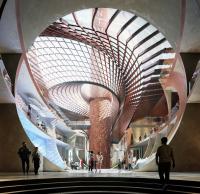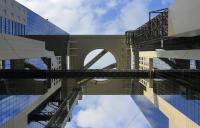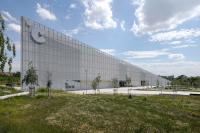Grand Hotel Straubinger
Bad Gastein, Austria
Grand Hotel Straubinger
Honouring the historical fabric.
The new Hotel Straubinger, named after a prominent local hotelier family, pays homage to the original grand hotel. It was born from the facets of its past, boasting understated elegance and poignant grandeur.
When guests enter the new Grand Hotel Straubinger, they are immediately captivated by the history of this venerable building. In the historical reception area, their room cards are handed to them from a velvet-lined drawer as if they were pieces of jewellery. The grand staircase that leads to the upper floors is straight ahead, while the F&B area is located to the right of it. The double doors of the café, which can seat 40 in total, give onto Straubingerplatz, where the outdoor seating directly on the square can accommodate 12 guests. The bar and the salon directly adjacent to the café provide the perfect setting for the end of day; the salon can be closed off with curtains as needed. In line with the principle of “working with the layers of the past”, all areas feature a contrasting mix of old and new, such as the combination of the existing wainscoting with modern, adapted wall panelling. “Depending on the time of day and how the respective areas are used, the furniture and colour scheme get progressively darker,” says BWM project manager Marlene Gesierich. The predominant colour used in the café is the modern shade “strawberry cream”. In the course of renovations, sage-green layers of paint were discovered beneath the old wall panelling in the salon and bar, inspiring the use of that same colour for the new look. And the Straubinger cake serving trolley is a nostalgic detail …
With a contemporary spin.
The original restaurant entrance, which features stunning rediscovered mural paintings, was transformed into a private dining room for 10 guests. The new entrance to the grand hall is in the new adjacent building with floor-to-ceiling glazing. In the course of restoring the grand hall, gold accents and the original ceiling in the side wings came to light. Historical elements that could not be preserved were given a thoughtful contemporary treatment. With seating for 86 guests, the grand hall features modern, fresh colours such as green, apricot and amber, while abundant greenery, refurbished Lobmeyr wall panels and a new chandelier reinforce the French-inspired atmosphere. Thoughtfully selected colours and patterns, such as the orange used for the pillars and stucco lustro, characterise the 195sqm hall. The heritage-protected solid oak parquet flooring was restored to its original state. An eye-catching, round dining table is positioned in the centre of the room atop a specially designed carpet that mirrors the ceiling rosette. Placed on top of the table is a spectacular chandelier, newly created by Lobmeyr but based on the lost original piece. The two balconies afford a view of the church.
The wine cellar is located in the basement, which – by virtue of the building’s location on the hillside – features a balcony with a view of the church. The wine cellar transitions into an oblong room with a coved vault, where the chef’s table has a direct line of sight with the kitchen. The original wood ceiling needed to be replaced, and after removing the thermally treated dowelled timber beams, they were used to make the chef’s table, which can seat up to 14 guests. The wine & dine area features original, wrought-iron lamps (restored by Lobmeyr) and terracotta tiles on the table surfaces.
Swimming out into nature …
To the left of the entrance, on the west side of the building, is the spa area, which spans the top three floors. Coming from the lobby on the ground floor, guests first enter a courtyard with a chessboard floor (including chess figures), based on the chessboard tile floors in the original treatment rooms. This is a recurring pattern that is also found – albeit in different colours – in the restrooms, corridors and spa reception. On the mezzanine floor are the five new treatment rooms as well as four spa suites, which are spacious rooms featuring free-standing bathtubs, showers installed in converted original basins, and integrated pine saunas. There is a new pool landscape above the original thermal bath tract, where guests can gaze across Gastein Valley and “swim out into nature” to the sound of the nearby waterfall.
The spa area spans a total area of close to 700sqm (350sqm indoors, approx. 330sqm terrace with pool) and seamlessly merges the old building and the newbuild. Guests coming from the reception and fitness area in the old building can cross into the new building with its outdoor infinity pool and indoor pool. The panorama saunas in the sauna area are located on the top floor; the rest area, furnished with a fireplace, wood storage space and wooden slat acoustic ceiling, is on the second floor. The spa’s colour scheme has a maritime feel, with the ceiling above the pool clad with blue tiles. This is complemented by a mix of thermally modified ash wood, exposed concrete, and chrome and wood details.
Unobstructed view.
The structure adjacent to No. 1 Straubingerplatz could not be preserved and was redesigned as a projecting glass structure with a lamella facade mounted in front of the two upper floors. “The expansive glazing opens the building up to the valley, giving guests an unobstructed view of the natural surroundings,” says Markus Kaplan of BWM Designers & Architects. “The wooden lamellas in front of the glass prevent prying eyes from looking in, thereby ensuring the privacy of these rooms.” Incidentally, in the course of this redesign, the original gap between Hotel Straubinger and the house at No. 1 Straubingerplatz, which was closed up in the early 20th century, was opened up again.
- Architects
- BWM Designers & Architects
- Location
- Straubingerplatz, 5640 Bad Gastein, Austria
- Year
- 2023
- Client
- Straubingerplatz Immobilien GmbH
- Team
- Erich Bernard, Markus Kaplan, Peter Foschi, Marlene Gesierich, Martina Lehner, Claus Hasslinger, Elisabeth Albenberger, Ismail Berkel, Maximilian Fasslabend, Lena Hainzinger, Tanja Hainzl, Clemens Hörl, Marlies Klauser, Ales Kosak, Sonja Leitgeb, Massimiliano Marian, Elisabeth Morillo-Napetschnig, Fridolin Öhlinger, Tjasa Rus
- Markenstrategie und Branding
- moodley brand identity
- Teppichdesign/Mitarbeit Leitsystem
- Gabriele Bruner
- OEBA
- edelmueller.architektur.manageme
- Tragwerksplanung
- Gschwandtl & Lindlbauer ZT GmbH
- TGA
- Ingenieurbuero Lothar Mayer GmbH
- Bauphysik
- TAS Bauphysik GmbHB
- Brandschutz
- Norbert Rabl Ziviltechniker GmbH
- BauKG
- Lackinger BauKO GmbH
- Bauhistorisches Gutachten
- EIDOS Architektur ZT GmbH
- Vermesser
- Gernot Fleischmann
- Landschaftsplanung
- Simma Zimmermann Landschaftsarchitektinnen OG
- F&B Beratung
- Baysics, Georges Desrues
- Lichtplanung
- Pokorny Lichtarchitektur
- Teppichdesign/Mitarbeit Leitsystem
- Gabriele Bruner
- Interior Styling Konzept
- Atelier Peter Weisz mit BWM Designers & Architects
- Kunstkonzept
- BWM in Kooperation mit Andrea von Goetz von Schwanenfliess





















